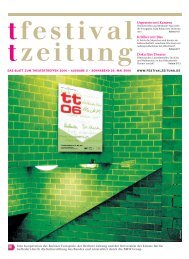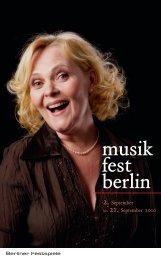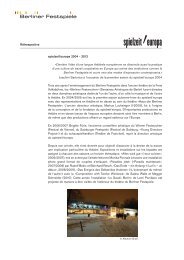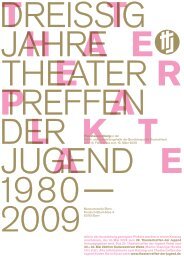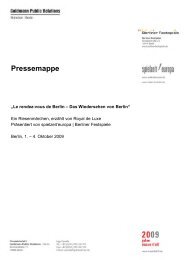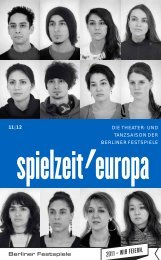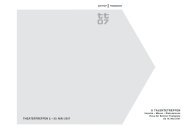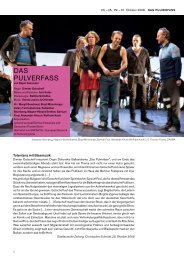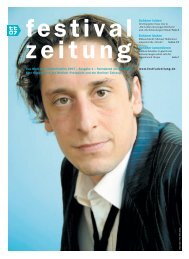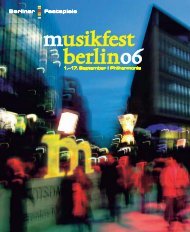Programme of the 9th international literature festival berlin 2009
Programme of the 9th international literature festival berlin 2009
Programme of the 9th international literature festival berlin 2009
Create successful ePaper yourself
Turn your PDF publications into a flip-book with our unique Google optimized e-Paper software.
Wed, 9.09. at 6pm, Haus der Berliner Festspiele / Main Stage<br />
Inauguration<br />
Arundhati Roy (India): Democracy’s failing light<br />
GREETINGS: Joachim Sartorius, Ulrich Schreiber, INTRODUCTION: Michi Strausfeld,<br />
MUSIC: Aydar Gaynullin<br />
In her first, partially biographical novel The God <strong>of</strong> Small Things, <strong>the</strong> Indian writer Arundhati Roy<br />
broke <strong>the</strong> taboo <strong>of</strong> forbidden love with an “untouchable,” a person who does not belong to any<br />
social caste. In 1996, its first year <strong>of</strong> publication, <strong>the</strong> book was translated into 32 languages. For<br />
this work, Roy received <strong>the</strong> Man Booker Prize for Literature. In 2004, she was awarded <strong>the</strong> Sydney<br />
Peace Prize for her work in social campaigns as well as her advocacy <strong>of</strong> non-violence. Event with<br />
simultaneous interpretation. Headsets available in <strong>the</strong> downstairs foyer.<br />
Wed, 9.09. at 8pm, Haus der Berliner Festspiele / Main Stage<br />
Literatures <strong>of</strong> <strong>the</strong> World<br />
Aleksandar Hemon (Bosnia/USA)<br />
PRESENTER: Sigrid Löffler, SPEAKER: Frank Arnold<br />
Hemon’s latest novel Lazarus, portrays <strong>the</strong> fate <strong>of</strong> a Jewish immigrant in Chicago, and was<br />
nominated for <strong>the</strong> National Book Award. Critics praise Hemon’s texts for <strong>the</strong>ir masterful command<br />
and powerful use <strong>of</strong> language. His material, articulated at times using exaggerated imagination,<br />
laconic naiveté, and disrespectful, shocking humour, is predominantly drawn from his experiences<br />
as a Serbo-Croatian immigrant: his hybrid identity is suppressed in <strong>the</strong> distant, surreal past <strong>of</strong> <strong>the</strong><br />
expatriate and <strong>the</strong> foreignness <strong>of</strong> a new homeland.<br />
Wed, 9.09. at 8pm, Haus der Berliner Festspiele / Side Stage<br />
Focus Arab World<br />
Poetry Night I<br />
PRESENTER: Silke Behl SPEAKERS: Margarita Broich and Friedhelm Ptok<br />
Nujum Al-Ghanem (United Arab Emirates). Like many poets <strong>of</strong> <strong>the</strong> younger generation, she writes<br />
her short poems in so-called “free verse,” a clear readable style which is primarily used to write<br />
about <strong>the</strong>mes <strong>of</strong> love and desire.<br />
Joumana Haddad (Lebanon). Occasionally experimental in her means <strong>of</strong> expression, her poems<br />
<strong>of</strong>ten deal with <strong>the</strong> <strong>the</strong>mes <strong>of</strong> equal rights and female desire. She writes temperamental, sensual<br />
short stories, and is <strong>the</strong> editor <strong>of</strong> Body magazine.<br />
Abed Ismael (Syria). Ismael has published five collections <strong>of</strong> his poetry to date. He is trying, in his<br />
own words, to “rehabilitate illusions […], to glorify deception as one <strong>of</strong> <strong>the</strong> forms <strong>of</strong> freedom.”<br />
Moncef Mezghanni (Tunisia). His poems are short and <strong>the</strong> language sparse. Mezghanni’s<br />
popularity is largely due to <strong>the</strong> way he performs his poems, making <strong>the</strong>m seem like sound poetry.<br />
Ghassan Zaqtan (Palestine). His poetry speaks in glowing images <strong>of</strong> life, death and <strong>the</strong> everyday<br />
goings-on in <strong>the</strong> Palestinian territories, which he describes as a life-long stay in a shunting yard or<br />
waiting room in light <strong>of</strong> <strong>the</strong> unsolved conflict with Israel.<br />
Wed, 9.09. at 8:30 pm, Collegium Hungaricum<br />
Focus Arab World_Specials<br />
Intimacy under construction<br />
A project by Nora Amin and Gesine Danckwart: Berlandria, Bluephase <strong>2009</strong>.<br />
The <strong>the</strong>atre and film makers Nora Amin and Gesine Danckwart spent over a year toge<strong>the</strong>r, at first<br />
virtually and <strong>the</strong>n on location in Egypt and Germany, researching and developing texts and<br />
strategies for performance. Objectively personal and vulnerably political, each opens herself to<br />
questioning by <strong>the</strong> o<strong>the</strong>r about her life and environment. A reading performance and lecture from<br />
everyday life about work, survival strategies, freedom, and loneliness in East and West.<br />
2



